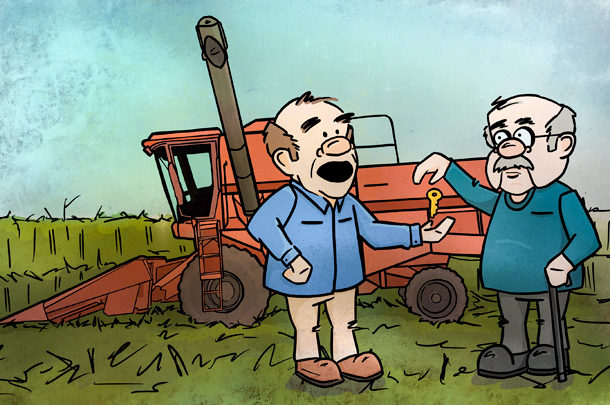A while ago, I attended a conference on leadership in San Antonio, Texas. Whenever I think about leadership, I think about something a minister shared with me. He said the mark of a good leader is not how well things go when they are in charge, but rather how smoothly things go once they are no longer leading.
In agriculture, we talk a great deal about farm transition and estate planning. It has been predicted that the amount of farmland that will change ownership in the next 20 to 30 years will be equal in size to the original Louisiana Purchase. That is a sobering thought indeed, but I cannot help but think part of the individual farm’s issue is not what will happen after the transition, but what is being done now to help those future leaders succeed.
On too many farms, reluctance to nurture leadership can lead to the creation of elderly teenagers – farm operators in their 60s who are still under the control of their octogenarian parents. That may seem humorous on the surface, but this dynamic exists on far too many operations.
Let me share two real life examples of farms where the transition of leadership was handled very differently. Both are dairy farms (well, one of them still is). The identities of those involved are withheld because it simply isn’t needed to tell the story. Let’s step back to the year 2001.
Dairy No. 1
I was visiting dairy No. 1 one beautiful summer day. As I approached the farm, I noticed earth-moving equipment busily constructing a new road leading from the dairy back into the fields. As the dairy farmer (who was 62 at the time) and I talked, I complimented him on his road construction and how important an investment it was in helping get machinery back and forth from the fields. “Oh, that’s not going to the fields,” he replied. “That’s my new escape route.”
“Escape route?” I asked. “Yep,” he answered. “My 83-year-old dad badgers me every time I sell a cull cow.”
His dad was a very successful and hard-working man but hadn’t been able to help on the farm personally after some health issues. His home, like most dairy producers, overlooked the dairy facility. His son shared that his dad was now relegated to monitoring the farm from a large picture window in the dining room.
“I tried showing him how little milk the cows I sell are giving, but he still thinks that 30 pounds of milk is enough to make money on,” the son continued. “So I am building this road so he thinks the cows are going back to the drylot. In truth, it circles right past the drylot gate [which was hidden from view] and comes out on the side road a half-mile away.”
I could not help thinking how much money was being spent by a 62-year-old to wrestle control over a dairy farm to which he had devoted his entire adult life. I felt truly sorry for him. Within a few years of that visit, the dairy closed. It really did not surprise me. It simply had not been allowed to grow to support a new generation of leaders.
Dairy No. 2
Now to dairy No. 2. Also in 2001, I nominated a young dairy producer for a prestigious regional ag award; he was selected to be our state’s representative at the final selection ceremony. Part of the judging process was to gather information about the farming operation, including plans for farm transition. The father of the then 48-year-old dairyman had died shortly after his son graduated college, and so I posed to him the question, “How long did your transition to decision maker take?” His answer was quick and more than a bit unexpected. “Three days,” he said. “I graduated on Friday, and when we all got home that evening, my dad said, ‘Well, when do you want to start?’”
“Start what?” the son inquired.
“Start to run the dairy!” his Dad thundered.
The young man did not really know what to say, and I guess his dad sensed his reticence, so he continued, reassuring him. “Look, you’re a smart young man. You just graduated from a great college, and I payed for you to get an excellent education. I invested in you because I believe in you. Your girlfriend is here. … I know you have to take her home tomorrow. How about we start 8 o’clock Monday morning?”
“That’s how it happened,” the award winner said. “He told me that he would be there to help me and that if I wanted his advice, all I had to do was ask, but he let me call every shot from that Monday forward.”
In retrospect, this farmer’s dad was prophetic. When he passed away suddenly of a heart attack at the age of 57, his sons had established themselves as successful farmers in their own right. The eldest son whom I had nominated for the award is nationally and internationally recognized as a premier breeder of dairy cattle. Within a few years of taking over for his father, he developed one of the most prolific bulls in the history of dairy cattle breeding. That bull went on to sire 11,345 daughters and 535 sons that were registered by their owners.
The younger son is just as accomplished as a businessman, mechanic and agronomist. Together, the brothers established one of the nation’s most productive dairy herds. They have expanded their herd and now bottle their own milk in response to market trends.
Leadership and letting go
A tale of two dairies – a tale of two leaders. One was afraid to let go; the other forced the conversation regarding his exit. The results bear out perfectly with what my pastor friend said. The true milestones of a person’s leadership are written long after their term as leader ends.
Success in agriculture, like any business, is not guaranteed. Farming is a very complicated and a risky business to begin with; however, much can be done to help shape the future by cultivating the leaders of our future today. ![]()
Andrew Overbay holds a Ph.D. in ag education and has more than 40 years of hands-on dairy and farming experience.

-
Andrew Overbay
- Extension Agent
- Virginia Cooperative Extension
- Email Andrew Overbay
PHOTO: Illustration by Kristen Phillips.












